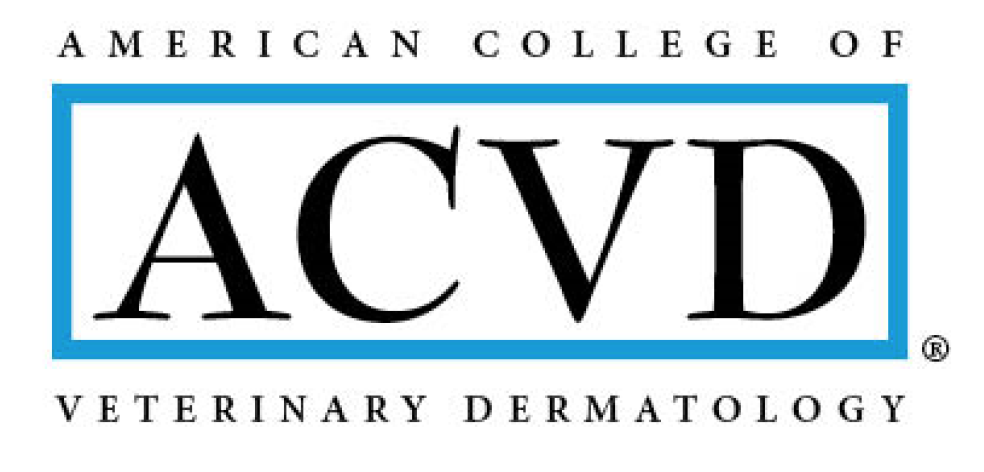WE ARE CURRENTLY NOT ACCEPTING APPOINTMENTS FOR THIS SERVICE.
This service is currently undergoing operational changes and is not accepting appointments at this time. Please continue to follow us on social media for updates.
Veterinary Dermatology
WE ARE CURRENTLY NOT ACCEPTING APPOINTMENTS FOR THIS SERVICE AS THE DEPARTMENT IS UNDERGOING OPERATIONAL CHANGES. PLEASE FOLLOW US ON SOCIAL MEDIA FOR UPDATES!
Consultation Services
- Allergic
- Infectious
- Hormonal
- Immune-mediated (autoimmune)
- Congenital
- Keratinization
- Neoplastic (cancer)
- Idiopathic (unknown or other causes)
Procedures
- Intradermal allergy testing
- Video otoscopy and anesthetized deep ear flush
- Skin biopsies for histopathology
- Cytology slides
- CO2 Laser
- Bacterial/fungal cultures
BOARD CERTIFIED VETERINARY DERMATOLOGIST®
A board certified veterinary dermatologist specializes in the management of animal skin diseases. Some of the most common reasons for consultation include bacterial and yeast skin/ear infections secondary to an underlying allergy. Many of these pets present with itch, hair loss, malodor, redness, rashes, and other lesions. Not all allergies are seasonal, as both food allergies and indoor environmental allergies can be year-round. Other times, skin changes can be due to immune-mediated diseases or cancers, and treatments would vary greatly. Based on discussion with your primary veterinarian, review of your pet’s history, a physical exam, and cytology slides, a veterinary dermatologist can help direct next diagnostic steps and procedures, whether it’s flea control, food trial, skin allergy test, ear flush, CO2 laser, or biopsy. If your pet is experiencing allergic symptoms or may have other skin/ear/nail/hair issues, then schedule an appointment today!
When Should My Pet See A Veterinary Dermatologist?
Additional training, experience, and knowledge is coupled with collaboration with your primary vet, thorough review of previous records, focused physical exam of the skin/ears, longer appointment times, frequent follow-up communications, and specialized dermatologic diagnostics and treatments.
SECONDARY INFECTIONS
Whether skin or ear, infections can be challenging, even if they are only a secondary issue (another primary cause lurks in the background). Whether bacterial, viral, fungal, or parasitic, treatments for these infections need to be tailored to the species, and then again based on the individual patient; concurrent diseases, drug interactions, side effects, bloodwork abnormalities, and risk vs. benefit all need to be taken into account. In an era of increasing concerns about antibiotic resistance, for both human and veterinary medicine, antibiotic stewardship is at the forefront of best medical practice. For example, if your pet has >3 skin infections per year, or a methicillin-resistant Staphylococcus skin/ear infection, or may require an anesthetized ear flush, then management by a dermatologist is strongly recommended.
ALLERGIES
Allergies are one of the most common reasons to visit a veterinarian, particularly a dermatologist. Flea, food, and environmental allergies are all diagnosed and managed differently. Only a food trial can diagnose a food allergy. And only exclusion of other diseases can confirm environmental allergy. The ideal long-term management of environmental allergy involves skin testing to make up allergy shots or drops. Before jumping into this financial and time investment, meet with a veterinary dermatologist to see what steps are best for your pet.
OTHER (ex. autoimmune, hormonal, cancer)
Skin lesions due to different diseases can all look quite similar. With experience, initial non-invasive diagnostics, and potentially skin biopsy, a dermatologist can help differentiate common from the uncommon, less concerning from more concerning. Autoimmune diseases (ex. pemphigus foliaceus) often require lifelong management and a fine balance between immunosuppression to control the disease and the potential for side effects. Hormonal diseases and skin cancers often are co-managed with an internist or oncologist, respectively. Finding the diagnosis for atypical diseases is only the start, so a dermatologist can help guide workup and management.



